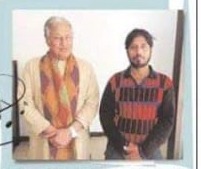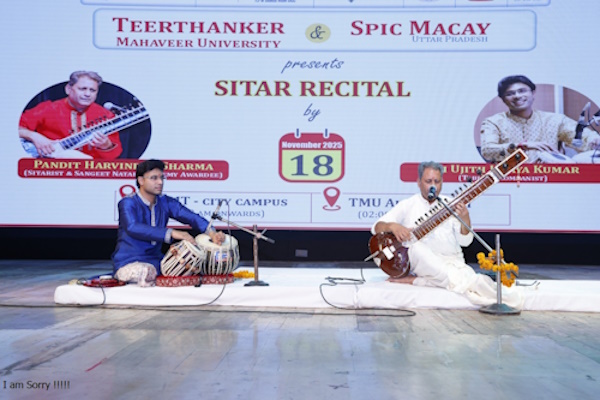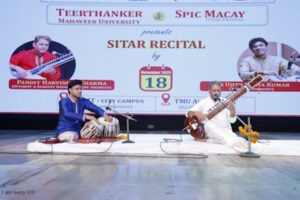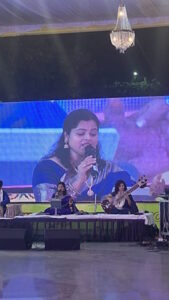Amjad Ali Khan is the era of sarod
Year 2014, month of November. It was the second annual festival of Viram Gurukul, the institute of Pandit Rajan-Sajan Mishra in Dehradun. There was also a performance by Ustad Amjad Ali Khan. It can only be called a coincidence that the next day I got an opportunity to talk to the maestro. When the conversation started, it became longer. Highlights of the conversation with him
Anand Agnihotri
Ustad Amjad Ali Khan and Sarod have today become synonymous with each other. As soon as the name of Sarod is mentioned, the image of the maestro appears in the eyes. Ustad Amjad Ali Khan needs no introduction. As soon as the discussion begins, it seems as if the wheel held in the maestro’s fingers is playing on the strings of the sarod. He got this position after long hard work. Amjad Ali Khan is a sixth generation artist of the Senia Bangash Gharana. Amjad Ali Khan, born to Ustad Hafiz Ali Khan in Gwalior on 9 October 1945, had indications that he would reach this milestone when he started exhibiting his art on the public stage at a young age. In the country, he has received many civil honors including Padma Vibhushan.
Even at the international level, he has won big awards in the music field. If seen, it is truly an era of Sarod in itself. Not only does he have command over traditional ragas, he has also composed many new ragas. His wife Subbu Lakshmi Barua Khan is also associated with Assamese music. Both sons Aman Ali and Ayaan Ali, like their father, seem determined to give new dimensions to sarod playing.
Guru-shishya tradition is maintained
About 15 years ago, I met Ustad Amjad Ali Khan in a five star hotel in Agra. Then we talked to him for about two-three hours but there was a lot of change in the ideology of the maestro between then and now. He was at the top in Sarod playing even then and even today he has achieved the same position. But at that time the music schools opened at various places looked like shops to them, but now they look like foundation stones. When asked whether the Guru-disciple tradition is disappearing in classical music, he answers with a smile that while it is disappearing, this tradition is still alive.
Viram Gurukul in Dehradun is an example of this, which was built by Rajan-Sajan Mishra. Here, not only singing training is given but the trainees are also given a stage, where they remove their hesitation by showcasing their art. He says that this tradition has not disappeared, yes, its form has definitely changed somewhat.There was a time when Guru was considered an institution. The disciples used to practice music by sitting at the feet of their guru.
Riyaz continued for months on each Bandish. Now the place of Guru has been taken by music schools where there are Gurus of every genre of music and they teach music to their disciples. Students also get degrees through schools. This cannot be considered inappropriate in the commercial era. It is true that the seriousness and spiritual practice that was there in the Guru-Shishya tradition is seen to be lacking in these institutions. The disciple also wants to hold the instrument today itself and go on stage the next day. The practice of music is not so easy. It becomes vocal only after years of practice. An example of how much efforts the maestros are making for the propagation of Sarod is the Sarod Ghar of Gwalior where the disciples of the maestro continue to practice continuously.
Politics has become based on religion
Whenever he talks about politics, a bitter expression appears on his face. He says that today religion has become the basis of politics. Every religion talks about peace but politicians are misusing it. He also expresses grief over the Uttarakhand disaster and the devastation in Kashmir. But do not forget to mention that relief work is also being linked to religion. He says that whichever party is in power should see that religion does not come in the way of the duty of humanity.
Ustad tells that once Prime Minister Narendra Modi was on a visit to America, at that time he too was giving a program in an American city. His tour was for about one and a half month. Some people sent a message to him that he should showcase his talent in Modi’s program also. But he refused because he was already scheduled to go there. However, later he met Prime Minister Modi separately in which he was fully respected by Prime Minister Modi. Had a very loving and affectionate conversation with him.
Musicians win and lose with words
I felt that I had started a wrong discussion. I then return to the mainstream of music. Maestro says that music is scattered in nature. Somewhere we get silent messages from nature and somewhere else we get them through the chirping of animals and birds. Just need to understand it. Take the works of our sages and saints Sur, Kabir, Tulsi, Gurunanak Dev, Meera, Jayasi and Rabindranath Tagore, ragas are mentioned in all of them. There is classical music in everything but at least understand it. The saints attained God on the basis of their musical practice. The seeker who does spiritual practice with true devotion definitely meets God.
Yes, discipline is also very important in music. Look abroad today, various types of music bands have been formed in which a large number of musical instruments are used, but only as per the instructions of their controller. There is no arbitrariness visible anywhere. There are two types of music. One is ‘pure sound’ which comes out through musical instruments, the other is the sound of the mind which we call singing. The music of India and abroad depends on the language. Just as politicians influence people with their speeches, similarly we musicians also win with words and lose with words.
The tunes have connected the world
Ustads say that when a composer’s tune is made according to his composition, it is more effective. Seven notes have connected the world. Be it the music of this country or of a foreign country. Only seven notes are working everywhere. Yes, we modify them as per our convenience. Referring to Cairo, he says about the Azaan in the mosques there that it should also be in tune. He himself gives a melodious Azaan and tells how impressive it is. How far will its impact reach? Whatever the prayer, it should not be in vain. Silent prayer has no effect.
Have presented on big platforms
Ustad tells that he has given programs in all the countries of the world and has achieved fame. Referring to South India, he says that the composition he composed and played at the Samadhi of Saint Raja was greatly appreciated. A day earlier in Dehradun, he had played Gandhiji’s most favorite Ram tune, Ekla Chalo Re of Raghupati Raghav Raja Ram and Gurudev Rabindranath Tagore. Referring to this he says that see with what expressions the listeners listened to both the tunes. This is just an example. While remembering the past, he does not forget to mention his tunes which he had played in front of Dr. Rajendra Prasad, Jawahar Lal Nehru etc. Everything is reflected on his face as if it is still fresh.
Shehnai went with Bismillah Khan
When asked about the future of classical music, the maestro says that there was once a time of kings, maharajas and emperors. Music flourished under his patronage. The situation is no longer like that. Now we ourselves have to make efforts for it and shape its future. In response to what would you like to say to the new generation, he says that all I would like to say to the new generation is that this path is very difficult. If you want to make it a source of livelihood then do not come into this field. This is a means of independent happiness. Make it a hobby but not a business.
Remembering the famous Shehnai player Ustad Bismillah Khan of Banaras, he says that Shehnai also went with him. There is a need to understand, not to tell, how miserable his last days were. What could the common people do to help them? Yes, if the government had helped them in time, perhaps they would not have had to face so many difficult days. Today’s government is the revenge of the kings and emperors. If he pays attention, the future of classical music can be bright.
For example, when a budding artist emerges after receiving training from an institute, then his job should be arranged. Due to having a fixed income, the musician does not have to face financial problems and his practice also continues. Now it depends on the government as to how much attention it pays towards this. All I have to say to music seekers is that it would be better if they make arrangements for their future and then enter the field of spiritual practice.
success is not achieved easily
When I draw his attention to his achievements, he says how many Amjad Ali Khans can there be in the world, how many Ravi Shankar, Bhimsen Joshi and Pandit Jasraj can there be. No one achieves this position easily. For this one has to put one’s life at stake. Even after this it is not certain that the destination will be reached. Therefore, it is more important to make arrangements for future livelihood first. Suddenly his attention goes towards the clock. He says, so much time has passed, now it is time for my flight. I have to leave. I salute him and leave. Ustad also leaves with his son Aman Ali.
Share this content:












Post Comment